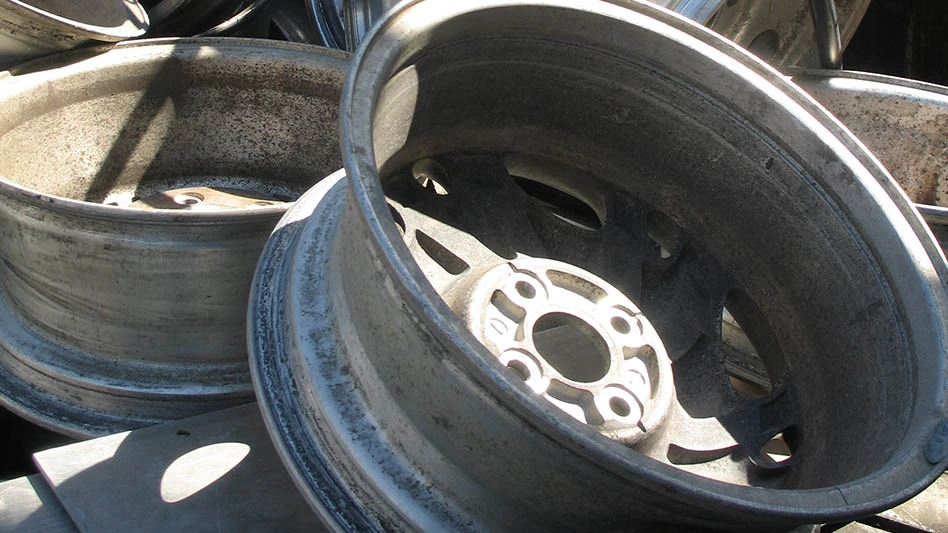 Incoming Institute of Scrap Recycling Industries Inc. (ISRI) incoming Chairman Doug Kramer says he is aware that the industry he grew up in and has worked in for most of his adult life has issues of extreme importance facing it.
Incoming Institute of Scrap Recycling Industries Inc. (ISRI) incoming Chairman Doug Kramer says he is aware that the industry he grew up in and has worked in for most of his adult life has issues of extreme importance facing it.
When Kramer becomes chairman of Washington, D.C.-based ISRI at the group’s 2014 convention in April, he says he will build upon the work his predecessors, fellow officers and ISRI staff members have done to make the scrap industry safer and more unified.
Asked to take part in a Recycling Today Industry Leaders Q&A session, Kramer, who is president of Los Angeles-based Kramer Metals, replied that he was honored to have the opportunity to let readers know what his priorities will be and why he believes the industry should feel strongly compelled to address the key issues of safety and materials theft.
Recycling Today (RT): For how long have you been involved with ISRI and why has being involved been a priority for you?
Doug Kramer (DK): My ISRI involvement goes back, really, to ISRI’s inception. I got involved at the end of 1986 and beginning of 1987, right during the transition from ISIS (Institute of Scrap Iron and Steel) to ISRI, and I started with chapter involvement (then called the Southwestern chapter) and then on to national involvement in 1988. I remember that the first committee I served on was the State Subcommittee, co-chaired by Cricket Williams and Shelly Padnos. That subcommittee was elevated in status to a full committee, called the State Committee, and I served on that; if I’m not mistaken, I think Scott Horne was the chairman.
I am truly fortunate to know and to have known many of our association’s past leaders and industry icons because of my father’s involvement in both ISIS and ISRI. Those individuals, and especially my father, strongly believed in giving back to the industry. My dad really instilled in me a strong belief in the importance of participating in the governance of the association and of volunteer leadership. My dad always taught me to fight for what I believed in and for what is right, and that’s why ISRI is a priority to me. To be chosen by your peers and, in some cases, by your father’s peers, to lead that fight on their behalf is both humbling and daunting. Howard Cosell summed it up best, “What’s right isn’t always popular, and what’s popular isn’t always right.” That’s how I live my life and it is how I intend on leading ISRI.
RT: How has being involved with ISRI changed the way you and your colleagues operate Kramer Metals Inc.?
DK: When you’re involved with companies that operate at the highest levels of efficiency, technology, compliance, ethics and so forth, there’s a tendency to emulate those companies—to try and “behave” like them in the best sense of that word at all levels. Because ISRI delivers programs and training like the Safety Blueprint, Operations Forum, metals ID and environmental compliance, and all of the government relations and management tools that are available, I’m constantly being pushed to be better, safer, more efficient and an exemplar for our industry.
As ISRI has become more demanding of my time, I have really had to lean not only on my dad but also on our entire organization for support. We’re fortunate to have a good team in place. I don’t have to worry that my dad is without help and that the business is somewhat adrift while I’m not there. The skills and programs that I bring back to the office from ISRI have really helped me get my employees prepared for the next two years.
RT: What are some ISRI initiatives and programs that you would like to see remain or be elevated as priorities in the years ahead?
DK: There’s no question that I am committed to changing our industry’s safety standing. There’s just no reason that we should be the fourth deadliest industry in the United States—that’s just unacceptable. I know we can do better. I also know that it is crucial that safety, as well as environmental compliance, is driven from the top down. We must do a better job of engaging the owners and/or presidents/CEOs of our member companies to truly make safety the top priority. If safety is first, then that has to be woven into the fabric of the company. Otherwise, we should be honest and say that safety is second or maybe third, behind profit and production, and that we accept injury and possibly death as a cost of doing business. Sounds pretty terrible when you put it like that, doesn’t it? So safety, for me, is definitely a priority.
The other major issue for me is the poor impression our industry seems to have with almost everybody but ourselves—we think we’re pretty great but it’s clear that not many other people agree. Just take two issues: metal theft and the EPA (U.S. Environmental Protection Agency) making a run at changing the definition of solid waste. We have to do better. We have to change how we are perceived, and it’s a big job because that change includes a lot of institutions, individuals, the media and, of course, government. I think a big part of that change will occur through our efforts with initiatives like JASON Learning (www.jason.org), which will educate children not only about what we do and its value but also the value of working in this industry. This industry will be part of their lives. Unfortunately, this is a generational change, so it will happen long after I’m gone from ISRI. We just have to change the perception of our industry—we have to.
 RT: To what extent have metals recyclers been able to have their side of the story heard and become part of the discussion on the issue of metals theft in the past few years?
RT: To what extent have metals recyclers been able to have their side of the story heard and become part of the discussion on the issue of metals theft in the past few years?
DK: Oh I think we’re definitely part of the discussion … the wrong part of the discussion! I mean, we’re fighting this fight simultaneously in Congress, at the state level, at the county level and at the municipal level! We’ve told our story and, in many cases, it’s been heard and well-received. But in many more cases—and this gets back to my answer to your previous question and changing the perception of our industry—our message gets lost. Actually, our message gets completely derailed because I think metal theft is such a local issue—that it is so esoteric a discussion based upon exactly where you operate that a lot of the discussion is just noise to local police and municipalities. We’re trying to send a unified message, but that message only works in particular circumstances.
In addition, and we have to be honest here, there are a significant number of industry participants who do not conduct their businesses ethically and who do not follow the law, and these are the guys that we are constantly compared to in the press and at hearings from Washington, D.C., to Anytown, USA. It’s just so difficult to talk about what a great job we are doing and how our industry is part of the solution and how great ScrapTheftAlert.com is and then get slammed with examples and pictures and anecdotal evidence that suggests the exact opposite is true.
And, as long as I’m venting here, it’s easy for legislators and some police departments to point at us and say, “These scrap guys are the problem.” I mean we’re easy to find—the legitimate scrap recyclers are easy to find, what we buy is easy to track because we’re following the law and most of us have deeper pockets than the thieves, so we’re slapped with punitive action and blame. We’re convenient to go after.
I believe people in positions of power think that if they just keep passing punitive laws on top of existing laws that lay burden on top of burden on the scrap industry, metal theft will go away. We all know that isn’t true, but if the police arrest a metal thief and prosecutors won’t prosecute the crime, guess what … we’re the bad guys by default because we’re an easy target.
RT: Are there still many recyclers who are not ISRI members and what is your message to them as to why it’s worthwhile to join?
DK: There are still a lot of recyclers who are not ISRI members, and I’d like to take this opportunity to reach out to them and encourage them to join.
The benefits of membership, aside from the member services and all of the education and training programs, really boil down to opportunity. The Superfund Recycling Equity Act (SREA) reports, for instance, are one of the most valuable and least expensive benefits ISRI offers and they afford the opportunity to avoid liability under Superfund. Those reports can literally make the difference between keeping and losing your business. You can’t get those without being an ISRI member. ISRI membership affords you the opportunity to identify new markets; the opportunity to meet scrap buyers not only from your region but from all over the world; the opportunity for your business to grow and to become more competitive; the opportunity to learn and share experiences with other business owners and managers; and the opportunity to build valuable relationships that begin as business opportunities and become lifelong friendships.
That said, let’s assume that all of that is not compelling enough to convince someone to join. The reality is that, because of ISRI, all of us in the scrap recycling industry are still able to conduct our business. Without the intervention of ISRI and the volunteer member leaders in ISRI over the past 25 years, our industry, as we know it, would not exist today in its present form.
The recycling business may be tough right now, but it could be a whole lot tougher. Believe me, business is booming in Washington, D.C., and in all 50 states’ legislatures, and there’s no lack of desire to promulgate bad legislation. Protecting our industry comes with a hefty price tag in terms of both human capital and real dollars, and that price tag increases every year.
Growing our membership is critical to this organization. Yet, despite all of this, there are still some industry participants that we just can’t seem to reach—they’re content to ride the coattails of our members and directly benefit from the hard work of ISRI staff and ISRI members.
I can’t imagine being a scrap recycler and not belonging to ISRI. ISRI membership is the best and least expensive insurance you can buy to protect your livelihood.
RT: Sustainability seems to have maintained momentum as a corporate practice. How can ISRI member companies tie into sustainability as a corporate goal for some of their customers?
DK: I think that ISRI’s RIOS™ (Recycling Industry Operating Standard) program provides an excellent way for members to demonstrate to their customers that they are supporting corporate sustainability goals by recycling in an environmentally responsible manner. More and more ISRI members are turning to RIOS to show their customers, competitors and peers that they are committed to the highest standards in the industry. RIOS is the only management standard developed for the recycling industry by the industry. From paper and metals to plastics and electronics, RIOS certification by accredited, third-party auditors provides assurance that a recycler is operating at the highest quality, environmental, health and safety standards. It’s a lot of work and a big commitment but well worth the effort.
RT: When you’re not taking care of Kramer Metals or ISRI business, how do you like to spend your time?
DK: You know, I have three families: I have my Kramer Metals family, I have my ISRI family and then I have my wife Jill and my two sons, Noah and Jonah. My wife and children have definitely been deprived of my time, to some degree, because I’m never really “off the clock” as far as the business is concerned, and ISRI has steadily increased its need for my time as I have moved through the officer chairs. I love to spend time with my wife and sons … I live for them. Everything I do is for them, so I don’t care what we’re doing, as long as we’re doing it together. I take them to as many ISRI meetings as possible just so I don’t have to be away from them. We love to travel, but when we’re home we love to go skiing, we mountain bike, we go camping a few times a year and, since we live in California, we obviously go to the beach as much as possible. In addition, the boys always seem to have a project we can work on—as long as I’m doing something with them, I’m good.
Jill and I have some great friends and some great neighbors, so we like to hang out, barbeque and just enjoy spending time together.
And, believe it or not, I really like spending time with my Dad away from the office. The older I get, the smarter he gets, and the more I appreciate spending time with him, and I especially like watching him with his grandchildren. I would never have had the opportunity to become the next chairman of ISRI, let alone do all the things I’ve done in my life, without my dad’s encouragement, support and approval. And, believe it or not, I really like spending time with my dad away from the office.
RT: Are there any business issues unique to California right now, and are any of these likely to spread to other states?
DK: Oh, man, don’t get me started on California! I’m lucky to live and work in the most business unfriendly, industry killing and litigious state in the Republic. Enough said. While all of that is, in my opinion, true, I think that everything that California does eventually infects the rest of the United States to one degree or another. Most of the time, that’s a bad thing. Sometimes, it’s not as much of a nightmare. Case-in-point: metal theft. I think that we actually have a pretty good metal theft law here. Now, if they’d only enforce it ….

Explore the September 2013 Issue
Check out more from this issue and find your next story to read.
Latest from Recycling Today
- RMDAS April figures show recycled steel price setback
- Steer World offers PEX plastic recycling machine
- New recycling grant program launches in Massachusetts
- Tire Recycling Foundation names executive director
- Dock 7 named 2025 Exporter of the Year at New Jersey International Trade Awards
- Waste Connections reports ‘better than expected’ Q1 results
- Commentary: How EPR is transforming the packaging industry
- Acerinox names new North American Stainless CEO






